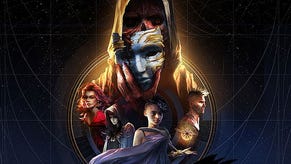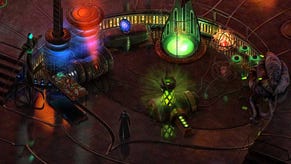Torment: Tides of Numenera Review
An occasionally brilliant RPG that ends too soon.
This article first appeared on USgamer, a partner publication of VG247. Some content, such as this article, has been migrated to VG247 for posterity after USgamer's closure - but it has not been edited or further vetted by the VG247 team.
At times, Torment: Tides of Numenera feels like the perfect role-playing game.
It's the sort of game where you're given a set of choices, every single choice seems viable, and the game responds and validates the choice you made. It's the dream of freedom of choice, as promised by Torment's predecessor Planescape: Torment as well as games like the Fallout and Deus Ex series. What makes a great RPG is being able to or say whatever you might want to, and the game accepts and even encourages that. That's Torment—just go with the flow.
Flowin' with the Tides
"Go with the flow" is especially good advice for Torment in a variety of different ways. It's great advice for your player character, the "Last Castoff"—the leftover body of a Changing God who switches hosts every decade or so—who starts the game off on an alien world, in an amnesiac haze. Most of the story involves figuring out what's going on, from "who am I?" and "what is this place?" early on to higher-order mysteries like "why do I exist?" and "what the hell is this giant organic monster that houses entire cities?"
Taking the game as it comes is also helpful mechanically, as Tides of Numenera is freed of the Advanced Dungeons & Dragons systems that limited its predecessor Placescape. And some of it is pretty alien. For example, instead of conventional damage effects like fire or ice, you can add transdimensional or chemical damage to spells and weapons. This sounds complicated, and perhaps it is; but fortunately, combat is both easy and relatively rare, so it's more like a flavor to the game than something to worry about mastering.
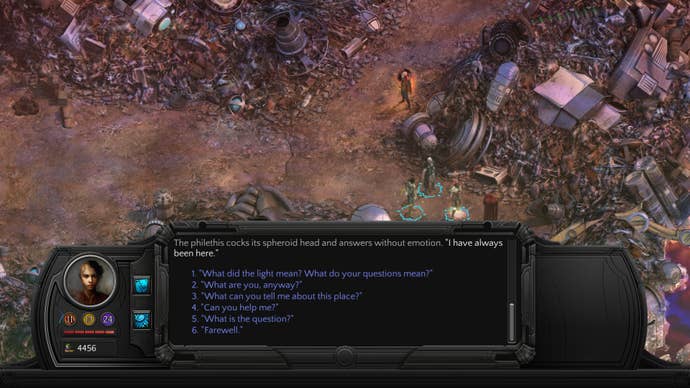
Combat—called a "crisis" here because they can be resolved through dialogue as well as violence—is rare because, like its role-playing inspirations, Torment wants to provide you with options for dealing with inevitable conflict. Happily, it makes those options legitimate decisions instead of simplistic "pacifism good, violence bad." I tried to play as a relatively moral character, which put me into combat more often than expected, largely because refusing it would have meant supporting cruel and amoral characters.
Torment uses a similar system for both combat and problem-solving outside of combat, where, based on your skills (like Quick Fingers or Lore: Machinery) you have a certain percentage chance of accomplishing your goals. Normally I dislike percentage-based skill checks in games, as they encourage save scumming, but Torment gets around this cleverly in two ways. First, it creates interesting failure states most of the time, using its writing to push your goals down a different paths, instead of just closing the door.
Second, you can gamble your attribute points to improve chances on skill checks. You have three attributes: might, speed, and intellect. But instead of serving as the core of your character's being, they serve as pools for gambling. If you need to convince someone in a conversation, you can gamble a couple intellect points and raise your chances from 45% to 85%—meaning that instead of being just a random number, they're investments that you make, which encourages players to take ownership of the results.
It's a very clever system, and as your characters progress, it's a system that also lends itself to creative character builds, like a Last Castoff with intellect buffs that lets them coast through most conversations, and a bunch of might skills for smashing skulls when circumstances require. Torment's relative easiness helps here, as it can make you feel super smart for getting a functional character build.
It's All Over in a Rush
In a longer game, the flaws in these systems might be more apparent. But Torment: Tides of Numenera, at 20 hours, is surprisingly short. This is good for the systems, but it ends up hurting the story and those good feelings of going with the flow. Torment is at its best when you just arrive in a new major hub and can start finding and working on all these different quests, but there are only two major hubs.
Some of this disappointment is inevitable. The thing that makes Torment work in these areas is the sheer amount of work that has to go into making sure that there are a wide variety of player choices for overcoming obstacles. But those things run out; there are only so many different quests in the game, and only so many paragraphs that can be written. As you start running out of quests in a city, those that remain are the more disappointing (or occasionally buggy) quests. It's here that Torment turns into a bit of a slog.
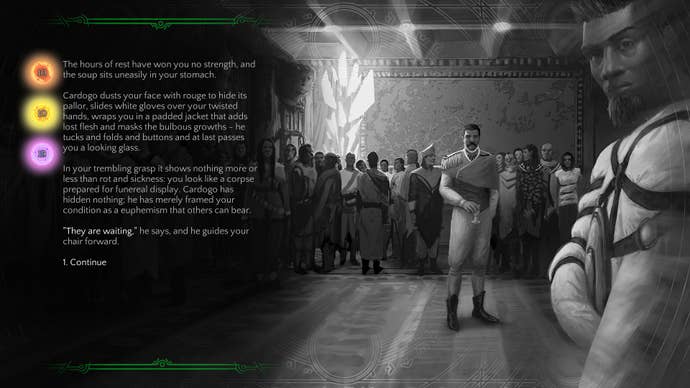
That's unfortunate because at its best, Torment: Tides of Numenera feels like you've been dropped into a pool of science fantasy role-playing goodness, and can just swim around and make your way through the game. Got a quest to open up an organic portal in that living city called the Bloom? The portal feeds on guilt. You can feed it a non-player character who owes you a favor. Or browbeat a party member into doing your will and taking the plunge. Or convince an accused criminal to prove her innocence in front of it. Or find a crashed ship's A.I., programmed to feel guilt about failing its passengers, take it into your head, and give it to the Bloom. Or just cut the thing open with a transdimensional scalpel you've fixed via a different quest chain.
Flowing along with the game's impulses seems to make sense—it is called "Tides of Numenera" after all. And while it's great when it works, those Tides are also some of the more confusing aspects of Torment. Whenever you make any notable decision in the game, you get an increase in one of the five colored Tides. They each stand for a different ideal—the blue tide represents curiosity and scientific inquiry, while red represents passion, both violent and emotional—they're alike a complex version of Mass Effect's paragon and renegade stats. They're also actual physical forces in the game world, which can, occasionally, be used to manipulate people, and they're are extremely important to the overarching plot involving a Castoff-murdering entity called The Sorrow.
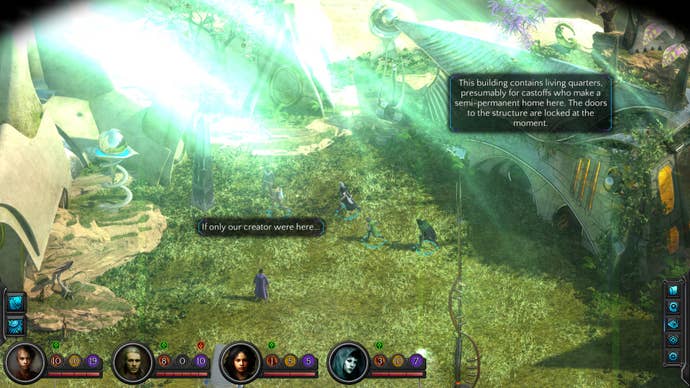
The problem is that the Tides feel half-baked on both terms. Mechanically, I found there was no place to see descriptions of what each Tide did—except randomly seeing a color described on a loading screen. You can also see what your Castoff's dominant Tide is at any given time, but not the others, not can see how balanced they are. I spent the entire second half of my game with a blue-gold tie, and nothing I chose ever seemed to displace that.
Likewise, I never got a firm grip on the entire Tide-Sorrow-Castoff mythology that theoretically informed the entire plot. By the end of the game, the politicking between various leaders of the Castoffs and the Changing God are the focus of the game, but most of them haven't been set up as characters throughout the game. Instead of feeling like the ending was a grand climax for Torment, it ended up feeling half-baked. It's not quite Knights of the Old Republic 2 levels of rushed, or even Dragon Age 2, but "wait, that's it?" isn't the best feeling to have at the end of a game that had previously demonstrated such wonderful bursts of creative detail.
Don't get me wrong, though: the rushed nature of the ending and other aspects of Torment: Tides of Numenera may leave a disappointingly bitter aftertaste at the very end of the experience, but it only stands out because the rest of the game is so good. The design and writing of the game are both wildly creative and meticulously planned-out in a manner that only the very best RPGs can manage. It isn't quite a perfect RPG, and it's probably impossible that any roleplaying game could be perfect. But Torment's striving for perfection comes so shockingly close to its goal that its inevitable failings barely detract from the overall experience.
InterfaceTorment does a superb job as a complex RPG that's simplified enough for wide appeal and controller support without being "dumbed down," although it does suffer from occasional annoying bugs.
Lasting AppealYes, it's got flaws, but the things Torment is good at like storytelling, player choice, and its creative science fantasy setting are so valuable and impressive that it's almost guaranteed to become a cult hit like Deus Ex, Alpha Protocol, or its predecessor Planescape: Torment.
SoundMusic and sound are consistently good without being exceptionally memorable. Voice acting is relatively rare but quite good when it's around.
VisualsTorment's backgrounds and setting are fantastic, but its character models lack detail and faces in ways that can make it hard to identify with any non-party member character.
ConclusionIf one of your favorite things in RPGs is finding a new location, and reveling in the rush of new quests and characters and dialogues and battles, then Torment: Tides of Numenara does that better than just about anything. It's disappointing, although not surprising, that Torment can't maintain that energy for a full game, especially with a rushed ending. But that's a small price to pay for a wildly creative and clever role-playing game.



